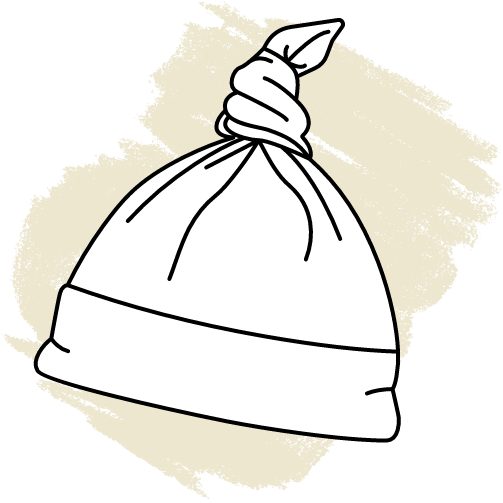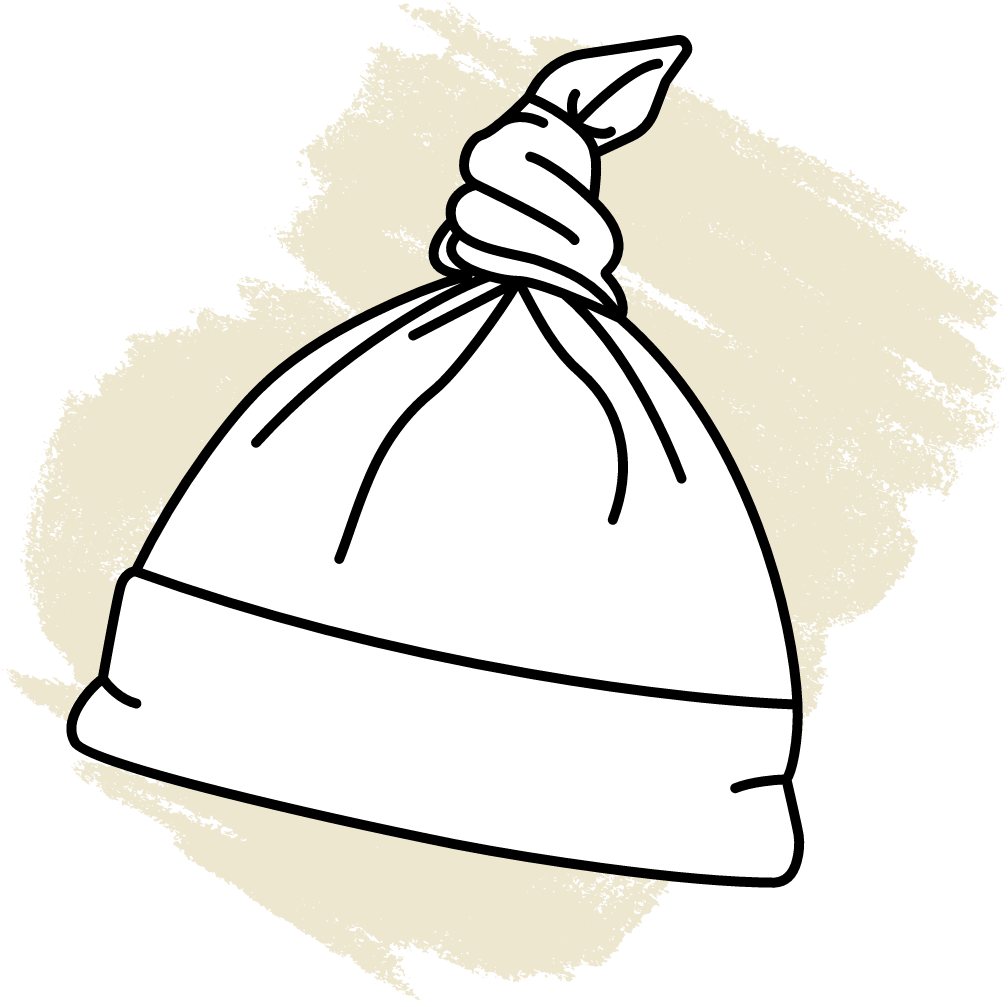Baby Products & Clothes Guide
Getting everything ready for when a baby arrives shouldn't feel overwhelming. In this comprehensive guide, you'll discover everything you will need for when your little bundle of joy arrives, ranging from nursery necessities and baby's first outfit, all the way to car seats, strollers, baby gates and everything in between.

Functional & Playful
Baby Travel Essentials
Having the right travel essentials for your baby can ensure you and your little one are ready to take on unlimited new adventures together.
Strollers & Travel Systems
Strollers and travel systems provide a safe and convenient way to transport your baby while on-the-go. Having a stroller system or wagon is also a great way to help make sure everyone is comfortable.
Shop Strollers & Travel Systems
-
Travel Systems
Includes a stroller, an infant car seat and a car seat base. These are great for transitioning from birth through toddlerhood.
-
Standard Strollers
Built with a sturdy frame, an adjustable canopy for sun protection and ample storage, these strollers are designed with versatility and practicality in mind.
-
Lightweight Strollers
Also referred to as an umbrella stroller, these are a great option when traveling or running errands, as they fold up quickly.
-
Jogger Strollers
Provide a safe, comfortable way for parents to include their baby in their active lifestyle. Large, air-filled tires and specialized features make it possible to jog on various terrains.
-
Double Strollers
Two children can ride together, either side-by-side or in a front-and-back arrangement. These are great for family outings or other adventures.
-
Wagons
Perfect for trips to the park and other outdoor adventures. They often have additional features, like built-in storage, cup holders or removable canopies.
Car Seats
It’s recommended that babies sit rear-facing in a vehicle for as long as they can, or until they reach the height or weight limits of each manufacturer. It’s important to consider the recommended size range and how a car seat integrates with other essentials, such as strollers or other baby items.
Shop Car Seats
Carriers
As your baby grows, you'll need to find a carrier that keeps the little one safe and secure, while making it easy on you to carry them for extended periods of time or while on the go.
Shop Baby Carriers
Types of Carriers
There are many different types of carriers to choose from. It's good to have a few different options to choose the right carrier for the correct activity. Here are the different types or construction of carriers and how each one is best suited for use.
Active Baby Gear
As your baby becomes mobile, it gets harder to keep an eye on your little one. Having the right baby gear like bouncers, play yards and swings provide peace of mind by keeping your baby safe and contained.
Shop Active Baby Gear
-
Play Yards
Also referred to as playpens, these are great to give young kids an enclosed space for them to either play or sleep.
-
Rockers
Comfortable and secure seats designed for little ones who cannot sit up on their own. Their back-and-forth rocking motion is soothing for babies, as it mimics the womb.
-
Bouncers
A slightly reclined seat on a wire frame that gently bounces up and down with your baby's movements. They often include a toy bar to keep your baby occupied.
-
Baby Play Mats & Gyms
Provides a soft supportive surface for babies. Integrated toys often feature a variety of colors, shapes, textures and patterns to help with physical, cognitive and sensory development.
-
Swings
Provide a safe and comfortable space for your baby. Its constant motion provides soothing stimulation for your little one, keeping them entertained so you can get things done.
-
Activity Centers
Great to help develop a baby's curiosity as they are surrounded with toys to help explore different textures, sights and sounds.
-
Baby Jumpers
Designed for babies who can hold their head up, jumpers provide entertainment and exercise for your little one, while also keeping them safely contained.
-
Walkers
Made in push-behind and suspended-seat varieties, walkers let babies explore safely using their feet.
Nursery Necessities
A nursery isn't just for sleeping. It's a multifunctional space that serves as a hub for daily routines such as feeding, diaper changes and playtime. Your baby's room should be carefully organized and include essentials that make it a safe, comfortable and convenient environment.
Baby Sleep Wraps
Getting your baby on track to sleep for longer periods of the night often takes some time.A sleep wrap can not only help with that, also help make nighttime feedings easier, as you can quickly and easily set your baby back down after feeding.
Shop Sleep Wraps
Types of Sleep Wraps
There are two basic types of sleep wraps that help contain your baby while they sleep. You'll want to find a sleep wrap that works best for them to help make the transition from womb to crib as seamless as possible.
Using a Sleep Wrap
Sleep wraps help hold onto your little one that allows them to fall asleep quickly without you needing to be the one to hold them. Here are some tips for when to use each type.
WHEN TO USE A SWADDLE
The tight wrap mimics a mother's womb and therefore is recommended for the newborn stage in the first few months. This helps prevent startle reflex which is caused by a sudden stimulation or disruption of balance in newborns.
WHEN TO USE A SLEEP SACK
Freedom of movement is important as a baby grows and a sleep sack allows a baby's arms to be free. You'll want to transition your child to a sleep sack starting at 2-4 months old or when they show signs of rolling over or discomfort when sleeping.
Thermal Overall Grade (TOG)
Babies have a hard time regulating their temperature. You'll want to find the Thermal Overall Grade that best matches the temperature of the room your little one will be sleeping in.
TOG RATING
0.2-0.5 TOG
1.0 TOG
2.5 TOG
2.5 TOG
IDEAL ROOM TEMPERATURE
Above 75°F
68-75°F
61-68°F
Below 61°F
Baby Feeding
Feeding your baby is a very special time for you to hold your baby close and bond with them. When feeding your baby from a bottle, there are many different considerations to think of like bottle type, the shape of the bottle and material type. When breastfeeding your child, there are many things to help keep both baby and mom comfy.
Shop Baby Feeding & Nursing
Bottles & Feeding
All parents want to provide the best start for their children, and feeding time plays a key role in this. From bottles and pacifiers to teethers and tableware, Heor's offers a comprehensive range of products designed to make feeding time a breeze.
BOTTLES
Made from silicone or glass, baby bottles come in a variety of types. Each type offers different advantages, like reducing colic symptoms or easy cleaning.
NIPPLES
Available in different options such as bottle type, material and shape. The right nipple for your baby depends on their developmental stage and feeding preferences.
BOTTLE WARMERS
Designed to efficiently and safely heat bottles of milk or formula to the ideal drinking temperature for your baby.
PACIFIERS
Made from soft, flexible materials like silicone, pacifiers provide comfort for babies and help them self-soothe.
TEETHERS
Used to provide relief for infants that are experiencing pain and discomfort during the teething process. Teethers are usually made from soft, flexible materials like silicone.
BIBS
Soft, absorbent accessories worn around the neck that protect a baby's clothing from spills and messes during feeding.
BABY TABLEWARE
Plates, bowls, cups and utensils made specifically for babies that are learning to self-feed. Baby tableware is made from durable and safe materials, and is often decorated with cute and colorful characters of motifs.
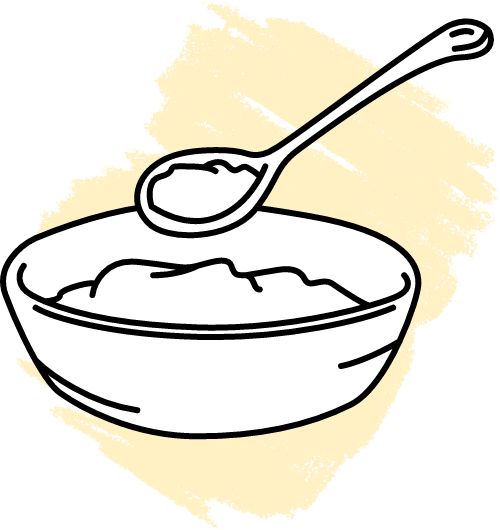
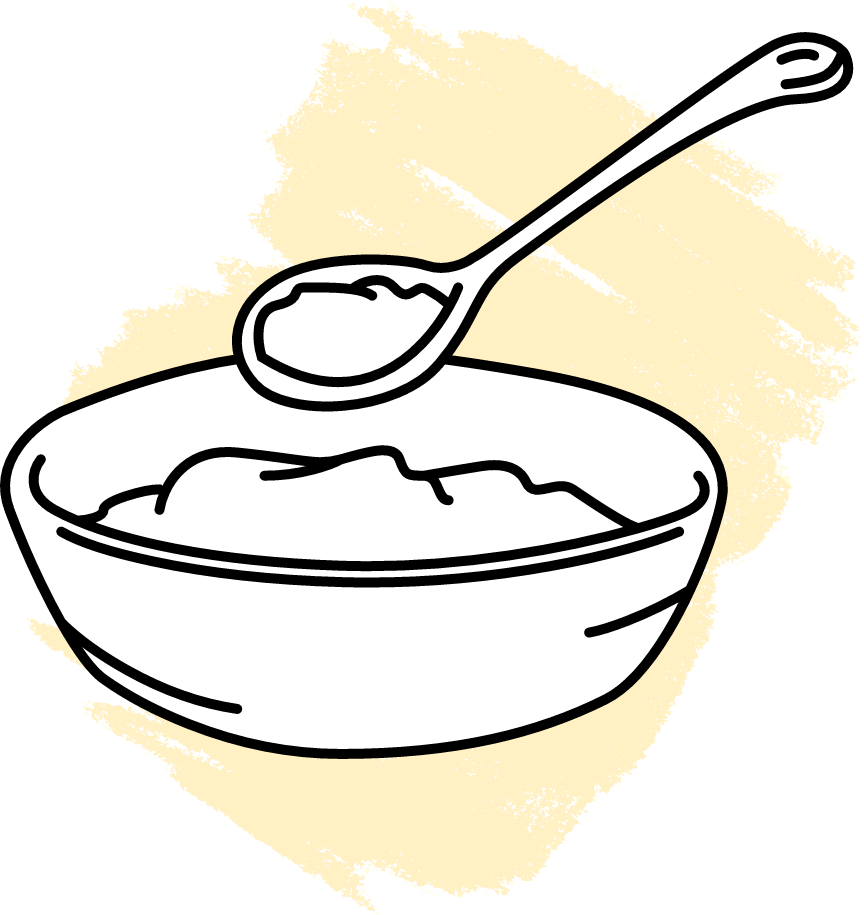
Baby Bottles
Bottles can be used for formula or expressed breast milk. Finding the right combination of bottle and nipple is simple once you know which type works best for each stage of feeding and the advantages of each.
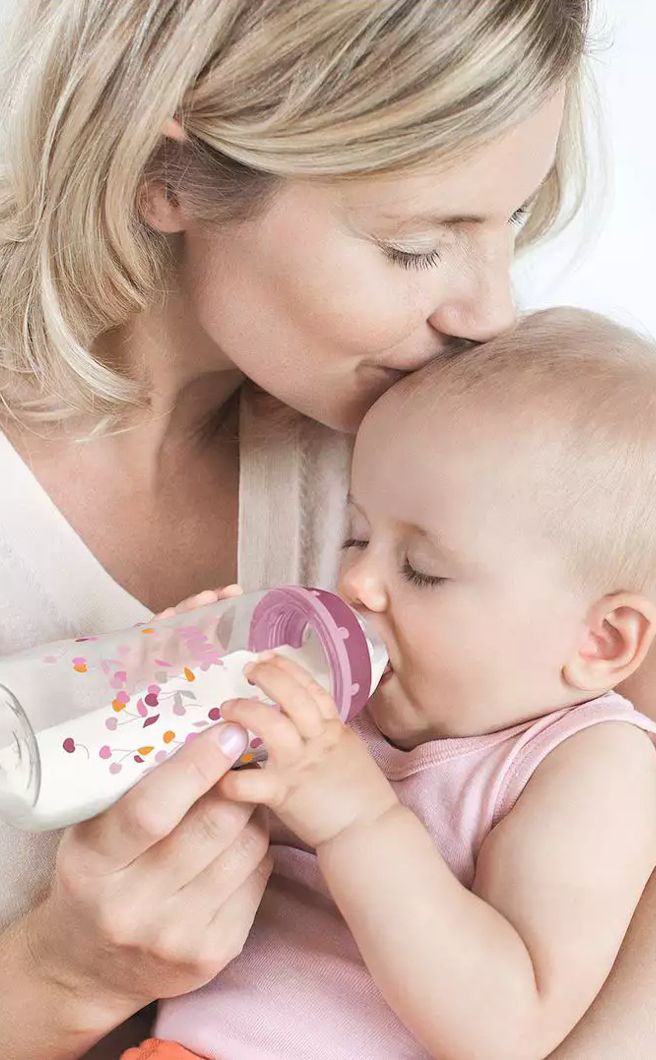
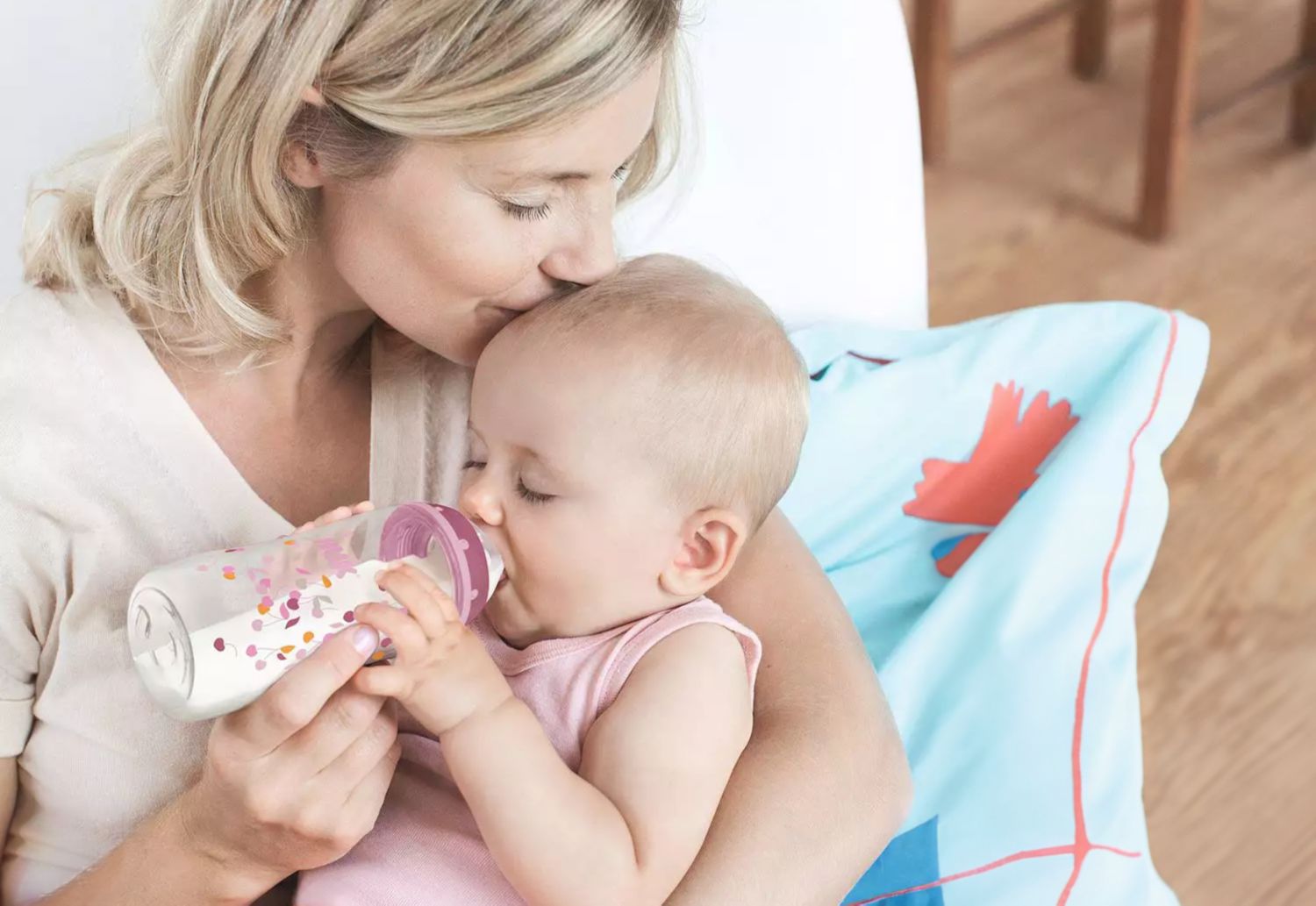
Bottle Material Types
There are two basic materials that baby bottles are made out of; glass or plastic. Each has pros and cons and you will want to find which type is best suited for how you intend to use and care for it in terms of cleaning and storage.
Nipple Flow
While they may look the same to the naked eye, the flow of the milk or formula from each flow size is very different. You'll need to have the correct size nipple flow to help prevent overfeeding and too rapid of a feeding which can cause your baby discomfort.
SLOW
Recommended for newborn to infants up to 3 months old.
MEDIUM
Recommended for babies aged 3 - 6 months old.
FAST
Recommended for babies older than 6 months old.
SMOOTH FLOW
Suitable for babies of various ages and designed to give a consistent flow to accommodate a baby's changing sucking pattern.
Nipple Shape
It's very important that your baby finds the correct nipple shape to help them latch on and feed. There are a variety of shapes to choose from and you'll need to find a nipple shape that your child easily latches to.
-
Dome Shaped
Rounder and consisting of a broader base that tapers to a narrow tip, these nipples tend to be compatible with most bottle brands and provide the greatest flexibility when choosing bottles or accessories
-
Flat
Has a flattened shape, especially at the tip, that helps resemble a nipple during breastfeeding when compressed. This helps to encourage a natural latch and sucking motion.
-
Wide
Slightly broader design and shorter than a narrow nipple. This helps encourage a wider latch that is similar to breastfeeding.
-
Narrow
These are great for babies who have a small latch or during the transition from breastfeeding to bottle feeding.
Bottle Shapes
It's important to find a bottle shape that makes feeding comfortable for your baby. The correct bottle shape can help eliminate the risk of air exposure when feeding which can cause gas or discomfort for your baby.
Bottle Sizes
The size of the bottle you need is determined by the timing in between feedings. Typically as a child gets older, feeding become less frequent and therefore willl require a larger bottle.

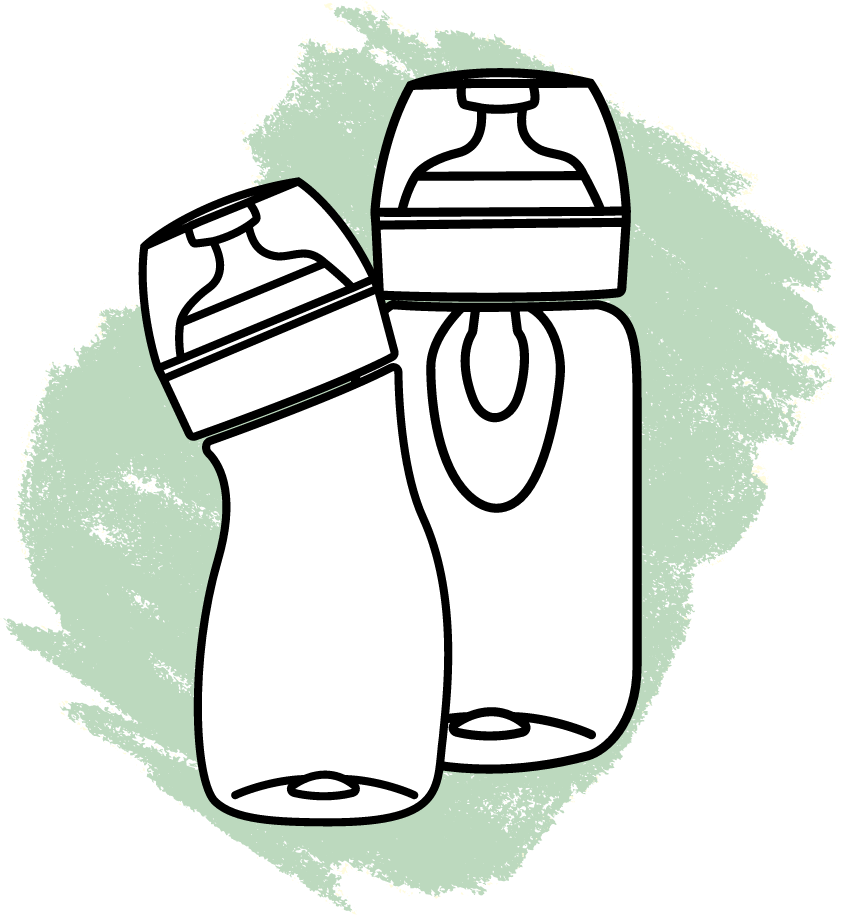
Important Things to Consider for Baby Bottles
You'll likely go through an assortment of bottle types, sizes or shapes while your baby grows. Here are all the things to consider when choosing which bottle is right for your baby or when considering changing which bottle you currently use.
BABY'S AGE
Younger babies typically need a smaller bottle due to their smaller stomach capacity. Older babies will require larger bottles as their appetite grows.
FEEDING FREQUENCY
You'll want to consider how often you plan to feed your baby. A smaller bottle can lead to the need for more frequent feedings.
GROWTH & DEVELOPMENT
As your baby grows, the way they feed and their feeding needs will also change. It's helpful to have multiple sizes and types of bottles and nipples at home to help transition.
PORTABILITY & CONVENIENCE
Smaller bottles can be easier to carry around when out of the house. Larger bottles can be more practical at home by helping to reduce the number of feedings.
BREASTFEEDING TRANSITION
If you are breastfeeding and supplementing with bottle feeding, smaller bottles can be handy for storing and feeding with expressed breast milk.
Feeding Chairs
When your child is old enough to eat solid foods, they will need a place to sit during feeding times. Feeding chairs offer a secure seat for your little one. With a variety of designs to choose from, you're sure to find the perfect feeding chair to match your family's lifestyle.
Shop Feeding Chairs
Things to Consider
There are many things to think about when picking the right feeding chair for your baby. You'll need to consider things like safety, portability and ease of use. Here are some important features to consider.
TRAYS
Cleaning is a breeze with removable trays. Be sure to consider how you plan to clean the tray and consider a dishwasher safe tray for even easier cleaning.
ADJUSTABLE SEATS
High chairs with adjustable seats are a great idea because they continue to provide safe and comfortable seating as your baby grows.
FIVE-POINT HARNESS
Safety should always be a consideration when picking the right baby products. Feeding chairs that have a five-point harness help to comfortably secure your baby into the chair.
COMFORT
Mealtime for little ones can take some time as they play with and discover new foods. You'll want to find a chair your baby can comfortably sit in for longer periods of time.
PORTABILITY
You'll not only want to think about how you will be using this chair, but also where you plan to use it. If you eat out or travel, a more portable option will allow flexibility to take on the go.
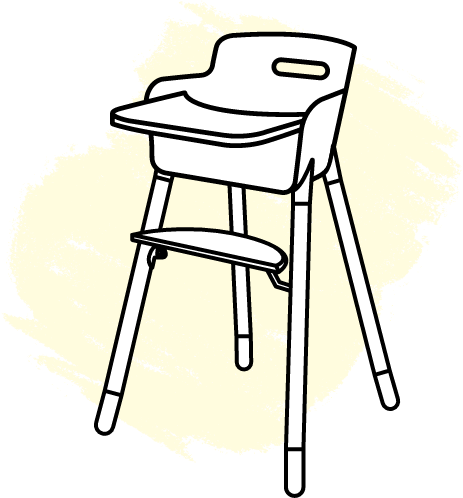

Pacifiers
Having your baby use a pacifier can be beneficial for many reasons including helping with soothing and pain relief when teething as well as overall development.
Shop Pacifiers
Pacifier Types
As any new parent can attest to, settling down a crying baby can be a challenge. A pacifier can be a great tool to help with that and finding the right type that works best for your baby is very important. Pacifiers help to calm and soothe your baby and here are the different types to help get you started.
-
Butterfly
These pacifiers have a butterfly-shaped shield with a rounded or orthodontic nipple.
-
One-Piece
Produced from a single piece of material, such as silicone, with no joints or seams to help make cleaning easier.
-
Teething
Pacifiers that helps soothe sore gums and emerging teeth to help comfort your little one.
-
Novelty
Pacifiers that come in many fun shapes and designs with decorative elements.
-
Nighttime
These are made of materials that glow in the dark to help your baby find their pacifier at night.
-
Toddler
Slightly larger in size, these fit the growing mouth of a toddler and have a sturdier design.
Pacifier Nipple Types
If your child is bottle-fed, you'll want to find the pacifier that is more aligned with the nipple shape they are currently using as it will likely be easier for them to latch onto. Here are all the different types of pacifier nipples to choose from.
Pacifier Sizes
There are 3 basic sizes of pacifiers and typically you'll want to stick to the correct size based on their age to best help their jaw and teeth development.
SIZE
Small
Medium
Large
RECOMMENDED AGE RANGE
Newborn to 6 Months
6-18 Months
18+ Months
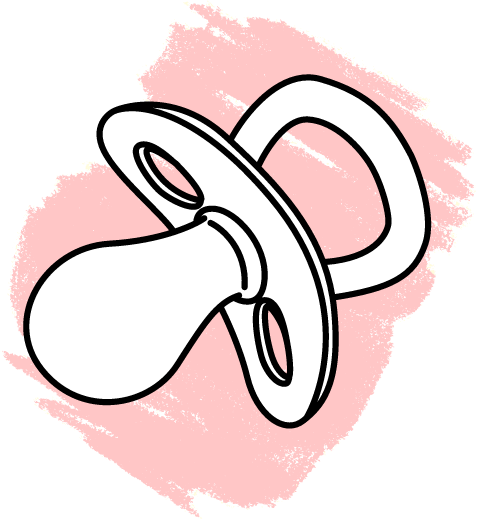
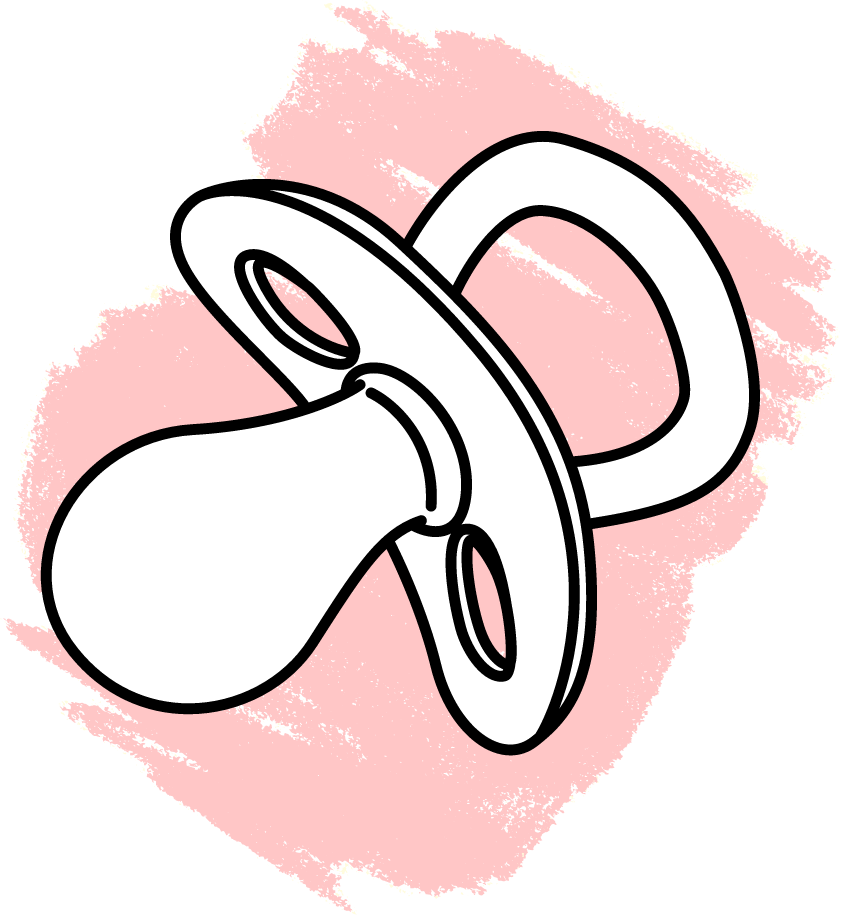
Tips for Choosing a Pacifier
In general, your main focus should be finding a pacifier that your baby easily latches to and wants to use. Here are some starting points for how to go about your initial search to find the right pacifier for your baby.
SAFETY CONCERNS
Ensure the pacifier meets safety standards and is free from harmful chemicals like BPA and phthalates.
AGE APPROPRIATENESS
Always choose a pacifier that matches your baby's age group to ensure the right size and developmental support.
COMFORT & FIT
Observe your baby's preferences and comfort. Some babies may prefer different shapes and materials.
REPLACEMENT
Regularly inspect pacifiers for wear and tear and replace them as needed to ensure safety and hygiene.
Pacifier Accessories
Pacifier accessories help you keep track of them from being lost as well as help you find the pacifier when your baby needs it.
Diapering
A baby's skin is sensitive, so regular diaper changes are important to keep their skin clean and dry. Having the right diapers and diaper accessories will help keep your little one healthy and happy every day.
Shop Diapering
Diaper Carriers
Carry not only everything you need to change a diaper, but ensure you have space for everything like clothes, snacks, sunscreen and lotions in one easy, convenient place for on-the-go days.
Diaper Accessories
When diapering your baby at home, these accessories help make diaper changes easy and convenient.
Types of Diapers
Diapers come in a range of styles, each designed with a specific age, activity or lifestyle in mind.
Bed & Bath
A consistent bed and bath routine is great for your little one. It helps create a familiar nightly schedule, and help promote overall good health.
Bedding
The bedding you choose should provide a warm, cozy and safe sleeping environment for your baby. You will want to find materials that combine the right amount of warmth and breathability with the right level of comfort and protection from spills and messes.
Shop Bedding
-
Receiving Blankets
A versatile, lightweight blanket that can be used for a variety of purposes. They are often used to provide warmth, as a cover-up during feeding, or for swaddling.
-
Crib Blankets
Can be used by babies older than 12 months for sleeping. Infants and younger babies can use crib blankets for tummy time, but their cribs should be free from any blankets or loose items.
-
Swaddle Blankets
A very thin blanket that is used to wrap your baby snugly and securely. This mimics conditions in the womb, which helps to calm your baby and promotes sleep.
-
Wearable Blankets
Provide warmth, comfort and freedom of movement to babies when they are too young for crib blankets.
-
Swaddle Wraps
Specifically designed to wrap tightly around your baby. Swaddle wraps are held securely in place with hook-and-loop closures.
-
Crib Bedding Sets
Bedding sets offer a cute and coordinated look for your baby's crib. They often include a quilt or duvet cover, fitted sheets, blankets and pillowcases.
-
Fitted Crib Sheets
Cribs should have minimal sheets and often just a fitted sheet will do. These are made of soft, gentle fabrics that are great for a baby's delicate skin.
-
Mattress Pads
A mattress pad not only adds a bit more comfort and cushioning, but adds another removable layer to help keep the mattress clean.
-
Waterproof Pads
Accidents happen. You'll want to consider a waterproof mattress pad to make cleanup of those messes as easy as possible.
Bathroom & Bath Time
Keeping your baby clean is important for your little one. Nightly baths are a great way to establish a routine, and can also help promote relaxation to aid in better sleep patterns.
Shop Bathroom & Bath Time

Bathtubs
Specially designed to provide a safe, comfortable and convenient bathing experience during your baby's first 6-9 months of life.

Bath Seats
A bath seat is a great way to keep your baby safely contained within the bathtub while they play and splash around during bath time.

Washcloths & Towels
Your baby's skin is sensitive. Be sure to have washcloths and towels that are made from soft, gentle fabrics like cotton to prevent your baby's skin from becoming dry or irritated at bath time.

Bath Robes
Made from the same material as towels, bath robes keep your little one comfy and dry between bath time and pajama time.

Bath Toys
Bath time is a time for learning and playing with a range of toys. This helps your baby increase their fine motor skills and aid in their development.

Step Stools
A step stool in the bathroom helps elevate the child to the sink height so they can practice handwashing and toothbrushing on their own.

Potty Seat Toilets
A small chair with a removable basin that is used when training your child to go potty on their own.
Health & Safety
Demonstrating good hygiene and providing a safe living environment are key elements to raising a healthy baby. Having the right health and safety products on hand will help keep your child happy and well.
Shop Health & Safety
Health Essentials
To help keep your baby healthy and cared for, you'll need the following items on hand.
GROOMING KIT
Great to have on hand at home but also makes traveling easy as they often include scissors, toothbrush, hairbrush or comb, emery boards and other items.
THERMOMETER
There are several types of thermometers in the market, including ear, forehead and rectal. Consider factors such as accuracy, convenience and your child’s age.
NASAL ASPIRATOR
Breathing or eating can become difficult if a baby has nasal congestion from a cold or allergies. A nasal aspirator helps open their airways.
FIRST AID KIT
As your baby explores their surroundings, scrapes and minor cuts are inevitable. First aid kits contain items that are essential to handling minor injuries.
SOUND & LIGHT MACHINE
Can provide a night-light and white noise or music at bedtime, or can stimulate the mind during playtime by casting shapes and colors on the wall.
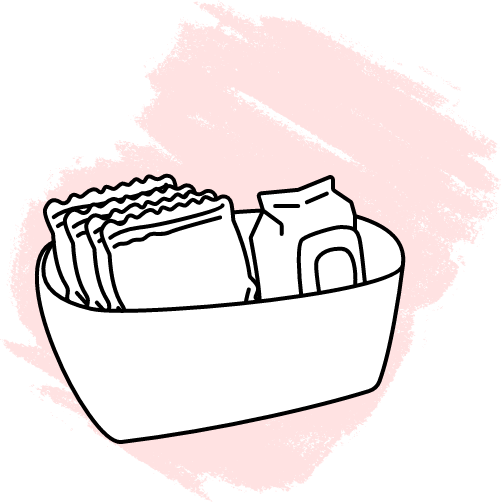
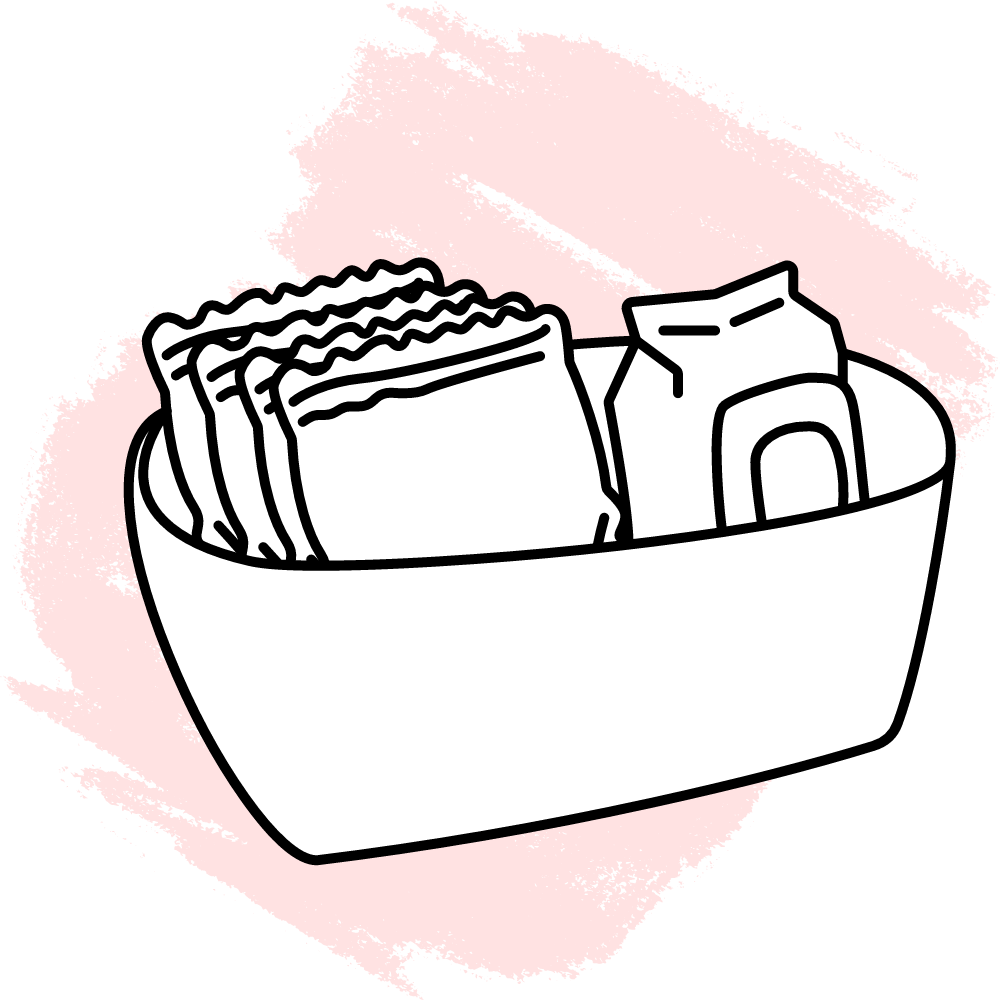
Making a Safe Place for a Baby
Babyproofing your home provides you with peace of mind while allowing your young child to safely explore and learn about their living space. Here are a few of the basics you'll want to include on your next shopping list:
Baby Monitors
Baby monitors are a great way to keep eyes and ears on your little one from afar. A range of features and capabilities means you’re sure to find one that best meets your needs.
Shop Baby Monitors
DUAL SCREEN
Also known as split-screen baby monitors, they allow parents to monitor the activities in two rooms simultaneously.
AUDIO ONLY
Basic monitoring devices that allow you to hear what is happening in your baby’s nursery from any room in the house.
REMOTE ACCESS
These monitors use an app to pair the camera to your smartphone or mobile device, allowing you to check up on your little one from anywhere you have a WiFi or cellular connection.
HEALTH MONITOR
A wearable device for babies that provides live monitoring of vital signs like movement, heart rate, temperature and breathing.
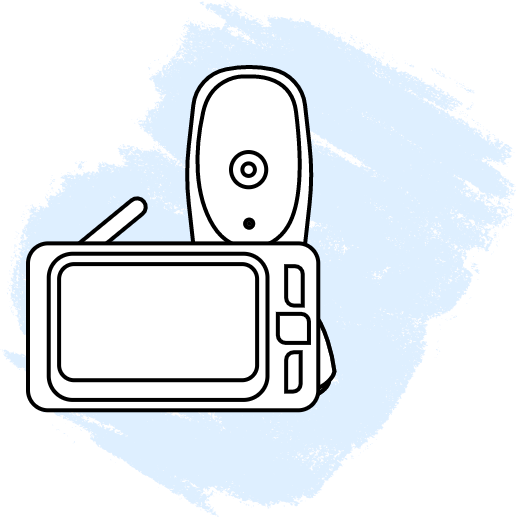
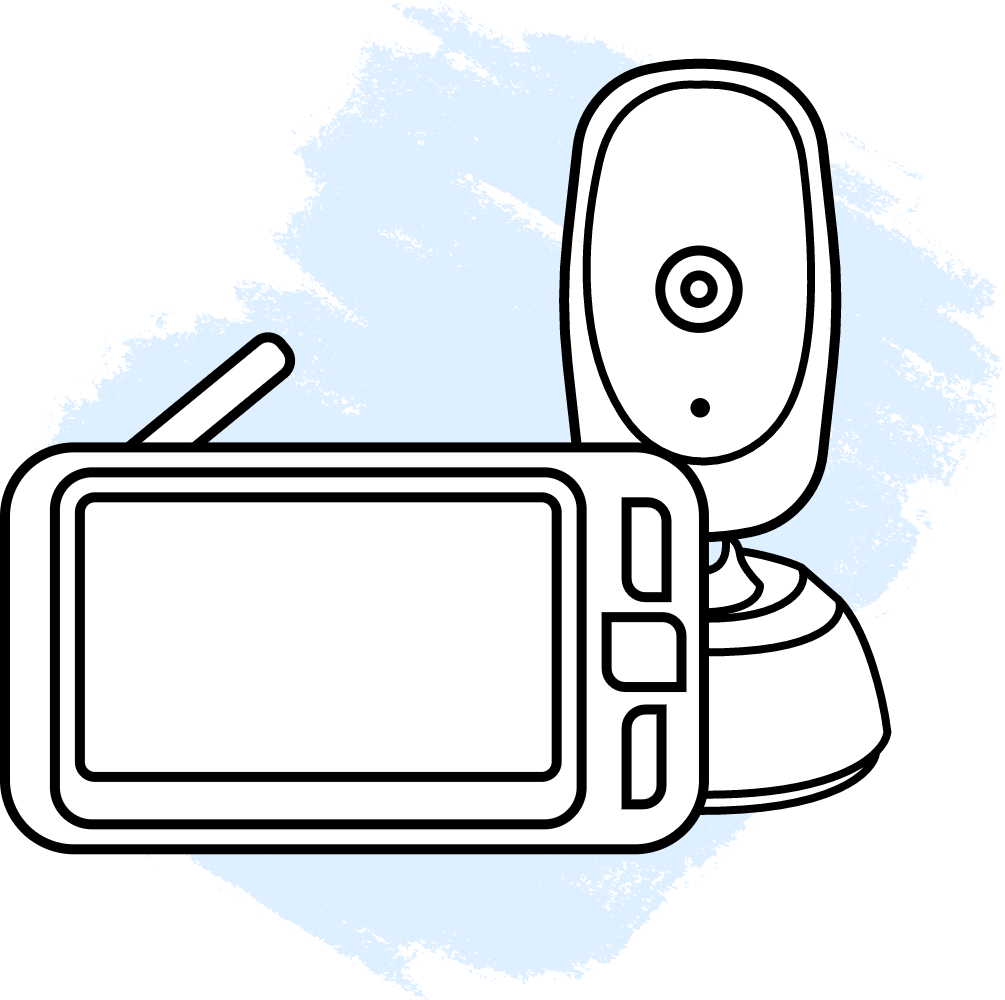
Baby Clothes
Shopping for your little one's arrival is an extremely fun and exciting time, but nothing is more fun than shopping for all the cute baby clothes they will need.
Shop Baby Clothes
Layette
A layette is a baby’s first set of clothes and other essentials. It usually includes items that are needed for the baby’s comfort and care in the first few weeks and months of life.
CLOTHING & ACCESSORIES
Bodysuits
Pants
Pajamas
Socks
Hats
Mittens
Receiving Blanket
Bibs
Burp Cloths
Washcloths
TOILETRIES
Shampoo
Lotion
Baby Wash
Baby Powder
Baby Oil
Diaper Cream
Cotton Swabs
One-Piece Baby Outfits
A one-piece outfit for babies is a great choice that allows for freedom of movement and encourages gross motor skill development. Babies are able to kick, crawl and explore freely which helps develop strength, coordination and balance.
Shop One-Piece Outfits
Tops
Tops are a great way to begin developing your little one's style. You'll want fabrics that are soft, yet thick enough to keep warm. Tops add extra cuteness to the many new photos you and others will be taking.
Shop Baby Tops
-
T-shirts
Baby shirts may have additional features like an envelope neckline or snap closures for easy dressing.
-
Polo Shirts
Collared shirt with a buttoned placket to give a more stylish look with short- or long-sleeved options.
-
Henley Shirts
Button placket at the neckline, similar to a polo but without a collar, for a more casual look.
-
Button-down Shirts
A pointed collar and buttoned front closure make this top versatile enough to dress up or down.
-
Sweatshirts
Keeping warm at any age is very important, especially for babies. Sweatshirts are great to add a layer.
Important Features for Baby Tops
It is not unusual for a baby to go through several changes of clothes in a day. Having tops with easy on-and-off features can make changing time quick and easy.
Bottoms
A staple in every baby's wardrobe, bottoms are designed to keep your little one comfortable and irresistibly cute! Vibrant colors, playful patterns and breathable fabrics ensure your baby looks good and feels good. Bottoms often have practical features like elastic waistbands and reinforced knees that are ideal for active babies who like to crawl and explore.
Shop Baby Bottoms
Sleepwear for Babies
Soft and breathable fabrics like cotton and fleece are all great for keeping your baby comfortable while sleeping. To help maximize comfort, look for pajamas with flat seams or tagless labels as well as stretchy fabrics to help allow for freedom of movement.
Shop Baby Sleepwear
Baby Accessories
Having individual style can start at any age. Baby accessories are a great way to add a bit of flair as well as function to your baby's look.
Shop Baby Accessories
-
Hats
From knit hats for warmth to hats that keep the sun out of baby's eyes, each season requires the perfect hat to complete the look and keep baby protected.
-
Socks & Booties
Keep feet warm, cozy and protected. Booties are great because they include nonslip soles or grippers on the bottom.
-
Mittens
Babies can have a hard time regulating heat. Mittens also help prevent your baby from accidentally sctratching themselves.
-
Sunglasses
Protect your baby's eyes from the harmful ultraviolet rays year-round and not just during the summer months.
-
Hair Accessories
From headbands and bows to clips and ribbons, hair accessories help keep hair out of the eyes and offer a cute way to coordinate an outfit.
Finding the Right Size
Finding the proper clothing sizes for children can be tricky. Each child grows at their own pace, and sizes can vary between brands. Here are some tips to help you choose the right fit
AGE-BASED SIZING
Most baby and toddler clothing brands use age-based sizing. Baby sizes are typically shown as ranges like 0-3 months or 6-12 months. Toddler sizes try to match the child's age in years and are labeled as 2T, 3T, and 4T, with “T” meaning toddler.
TRANSITIONING FROM BABY TO TODDLER CLOTHES
When transitioning from baby to toddler sizes (24 months - 2T), the key difference is garment length and width. Baby sizes will be wider and shorter cut, while toddler garments will be slimmer and longer in length.
KEEP GROWTH IN MIND
Kids grow up quickly, so it's smart to buy clothing slightly larger than what your child needs.
Baby Sizing Chart
Many brands provide size charts that help you choose the right size based on your child's height and weight. Having these measurements handy makes choosing the right size easier. Be sure to review the sizing charts for each brand, as sizing may vary by manufacturer.
Preemie
Newborn
3 Months
6 Months
9 Months
12 Months
18 Months
24 Months
Things To Consider for Baby Clothes
While cuteness is often a big factor in picking out baby clothes, it shouldn't be the only factor. You'll want to consider these other important things when picking out clothes for your baby to wear.
SOFTNESS
Softer fabrics help to minimize friction and help prevent rash or irritation.
BREATHABILITY
Small babies have a harder time regulating their temperature, so you'll want clothes made from fabrics that retain heat, but are still breathable.
DURABILITY
Life with a baby is full of spills and other messes. Make sure their clothes can handle the everyday wear and tear.
HYPOALLERGENIC
Your baby's sensitive skin may react to certain fabrics. Choosing fabrics that are hypoallergenic helps prevent irritation.
SAFETY
Avoid cords and drawstrings. Features like hook-and-loop or snap closures are great alternatives.
EASE OF CARE
Some outfits may require a bit more care when cleaning, such as if they have lace or other delicate enhancements.
CURRENT SEASON
Be sure to match the clothing with the current weather. As kids get older, you will have separate summer and winter clothes.
MOBILITY OF BABY
As your little one begins to move more, you'll want stretchy fabrics that allow for free range of movement.
